Online Learning provide a diverse set of courses that could range from being part of a standard, elementary curriculum to highly specialized learning content. Although the content could be directly out of a university classroom, the learning activities are typically designed to be interactive and cater to the needs of a large-scale group of participants. Course activities are generally flexible and students may themselves decide what level of learning/participation they would like to engage in.
There are some popular Online Learning hosting platforms but several Online Learning are also available on readily accessible websites such as Google, You Tube and Wikipedia. A majority of the established Online Learning portals require students to register with them in order to receive information on new courses or other related announcements.
What are the advantages of Online Learnings?
Some obvious yet key advantages of Online Learning include making education affordable (free!) and open to all those willing to learn, even in the remotest parts of the world, as long as they have access to the internet. In other words, Online Learning overcome the monetary and geographical challenges in accessing education.
For independent life-long learners, Online Learning are a great opportunity to be part of a global learning community. It is possible to continue learning without having to quit your job or sacrifice learning opportunities, for example if you have to take care of elderly parents or children at home and do not have enough time to attend regular university classes.
Yet again, through Online Learning, communication with reputed university professors can be established along with access to relevant reading materials that accompany the online courses.
Apart from these core tangible strengths, there are the more refined benefits stemming from education through Online Learning.
When a diverse group of participants come together from different parts of the world, a healthy exchange of varied opinions and perspectives ensues. Everyone learns from everyone else and brings to the interactive forum his/her strengths and competencies.
Courses are offered in multiple disciplines and everyone can take them, irrespective of their background. This means that in a given Introductory Economics-Online Learning, there could be a mix of political science graduates, chemistry doctorate students, mechanical engineers, sociologists and business professionals all studying basic economics along with high school students!
Last but not least, Online Learning are increasingly playing the role of talent search engines by discovering, for instance, child prodigies who may be studying in grade 8 at school in their home country, but who excel at learning quantum physics online with graduates and professionals.
Why professors gain from teaching Online Learning?
Firstly, there is the increased visibility and outreach aspect: For professors who are still establishing themselves in the academic world, Online Learning provide a powerful opportunity to connect with a huge online student community and becoming more well-known for one’s teaching abilities in global forums. For the already well-established professors, Online Learning help to further spread their ideas and reach a student audience they could never have reached if they were limited to delivering regular classes stationed at reputed universities.
Secondly, learning in Online Learning is a two way process. While the students benefit from the knowledge of the professors, professors also gather huge learning insights from their interactions with a diverse range of students from across the globe and take these insights back into the university classroom, further enriching the classroom teaching experience.
Thirdly, many professors benefit from using Online Learning as supplementary learning materials over and above their classroom lectures and thereby bust the popular myth of university professors feeling threatened by the development of free online education through Online Learning.
While it is true that professors are challenged with the increased burden of teaching and engaging with a large student base in Online Learning, they are also increasingly experimenting with the use of social media tools to boost cooperative and synergetic peer-to-peer learning, which correspondingly also reduces the burden of instruction being wholly on them.
What are the limitations of Online Learning?
One of the key downsides of Online Learning is the lack of accreditation and recognized certificates for learners after they have completed an online course. However, there is a positive trend among universities of experimenting with the idea of assigning credits for selected Online Learning courses.
Another major downside is that with the growing popularity of Online Learning, the Online Learning industry is finding it difficult to ensure the credibility of the content online and ensuring not just free access to any content but quality content.
Also, it must be kept in mind that digital literacy is a pre-requisite for using Online Learning. This may not be present in case of certain learners from disadvantaged backgrounds or those from remote areas lacking access to technological infrastructure.
Additionally, during an Online Learning a learner may be required to access several data streams from discussion forums like Wikipedia, Twitter or You Tube. Absorbing large amounts of information from multiple forums can often feel overwhelming for those learners who are not comfortable with such a dynamic and energetic learning environment. It is also possible that some courses run online without a specified facilitator, which may make it challenging for learners with difficulties finding someone to turn to, especially those who expect a high level of contact with the instructor.
Next, with the flexibility and choice that Online Learning provide, the learning success of the student often depends heavily on his own motivation and discipline. The influence of external checks like peer reviews can offer only limited monitoring value and the observed drop-out rate among some Online Learning is quoted to be as high as 90%.
And while Online Learning may deliver the best static content, it is still debatable whether they can match and replace the value of a classroom experience with the live presence of a human instructor.
Online Learning – What lies ahead?
The Online Learning model, though very exciting as an educational delivery model, is still in its emerging phase. Its increasing popularity suggests that a more defined and consistent model of Online Learning will slowly appear.
A definite trend is that of the growing acceptance of the model by universities and higher education institutions. They clearly do not perceive Online Learning as a threat trying to replace classroom education but rather as an outreach portal for their positioning before prospective students in different communities and parts of the world. Some like the State University of California and the State University of Georgia have even shown willingness to experiment with the idea of offering credits for Online Learning.
Another significant trend is that of increasing monetization of side services related with Online Learning. For instance, a leading Online Learning provider has begun to offer career services to its enrolled students and is earning revenue from the recruiting companies on every company introduction pitched before the students.
While, at least for now, taking a Online Learning still remains free (as was envisioned in the original concept), the accompanying fringe benefits of producing a digitally verified certificate etc. are already starting to come at a small fee.
In which direction the model progresses, only time will tell. However, everything said and done, Online Learning have opened a whole new world of possibilities for both students and instructors to engage with learning processes in an entirely different and dynamic way and they are here to stay!
edX | Free Online Courses by Harvard, MIT, & more
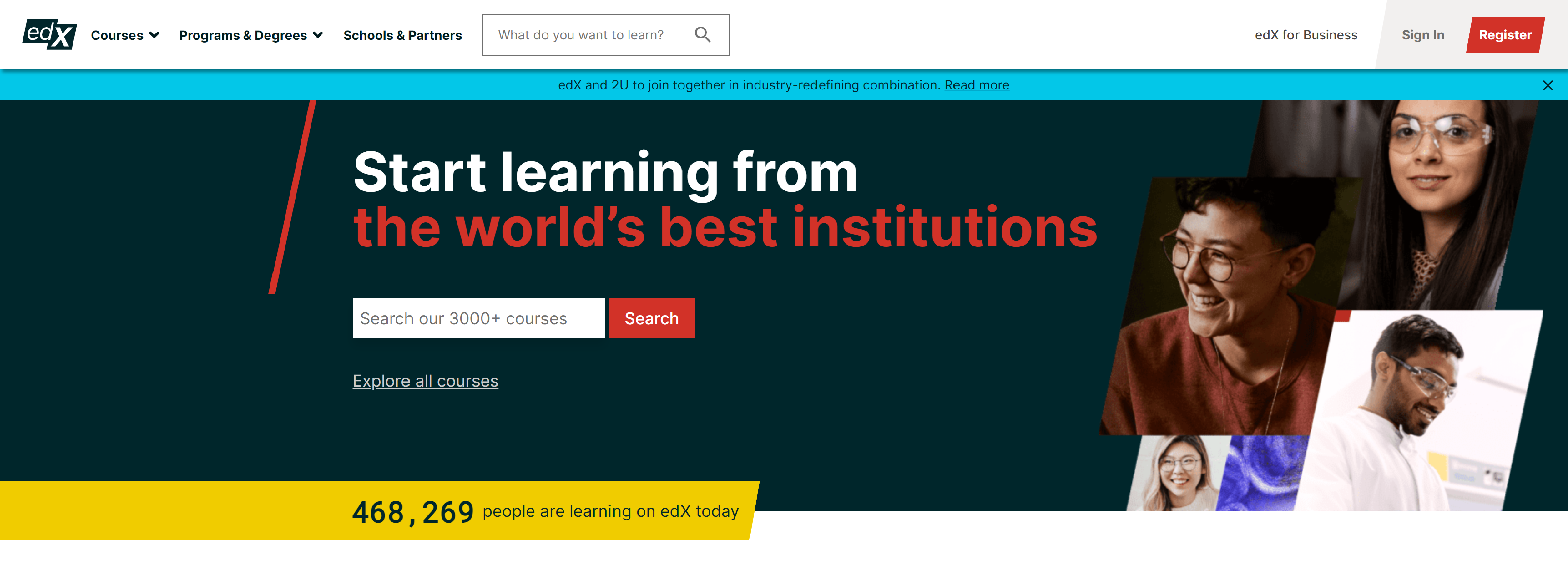
Access 2000 free online courses from 140 leading institutions worldwide. Gain new skills and earn a certificate of completion.
Computer Science:
- Azure
- Blockchain
- C Programming
- DevOps
- Django
- Full Stack Development
- HTML
- Java
- JavaScript
- Python
Language:
- Chinese
- English
- ESL
- Grammar
- Italian
- Japanese
- Mandarin
- Sign Language
- Spanish
- Writing
Data Science:
- Artificial Intelligence
- Big Data
- Cloud Computing
- Computer Programming
- Data Analysis
- Data Mining
- Machine Learning
- Power BI
- Python
- Quantum Computing
Business & Management:
- Business Administration
- Business Analysis
- Corporate Finance
- Economics
- Entrepreneurship
- Finance
- Financial Literacy
- Leadership
- Project Management
- Statistics
Engineering:
- Aerospace Engineering
- Biomedical Engineering
- Chemical Engineering
- Civil Engineering
- Computer Engineering
- Electrical Engineering
- Industrial Engineering
- Mechanical Engineering
- Software Engineering
- Structural Engineering
Humanities:
- Art
- Child Development
- Epidemics
- Fashion
- History
- Human Anatomy
- Literature
- Psychology
- Public Speaking
- Shakespeare
Udemy: Online Courses – Learn Anything, On Your Schedule

Udemy is an online learning and teaching marketplace with over 155,000 courses and 40 million students. Learn programming, marketing, data science and more.
Development:
- Python
- Web Development
- Machine Learning
- And More.
Business:
- Financial Analysis
- SQL
- PMP
- And More.
IT and Software:
- AWS Certification
- Ethical Hacking
- Cyber Security
- And More.
Design:
- Photoshop
- Graphic Design
- Drawing
- And More.
SAP Litmos LMS: Learning Management System
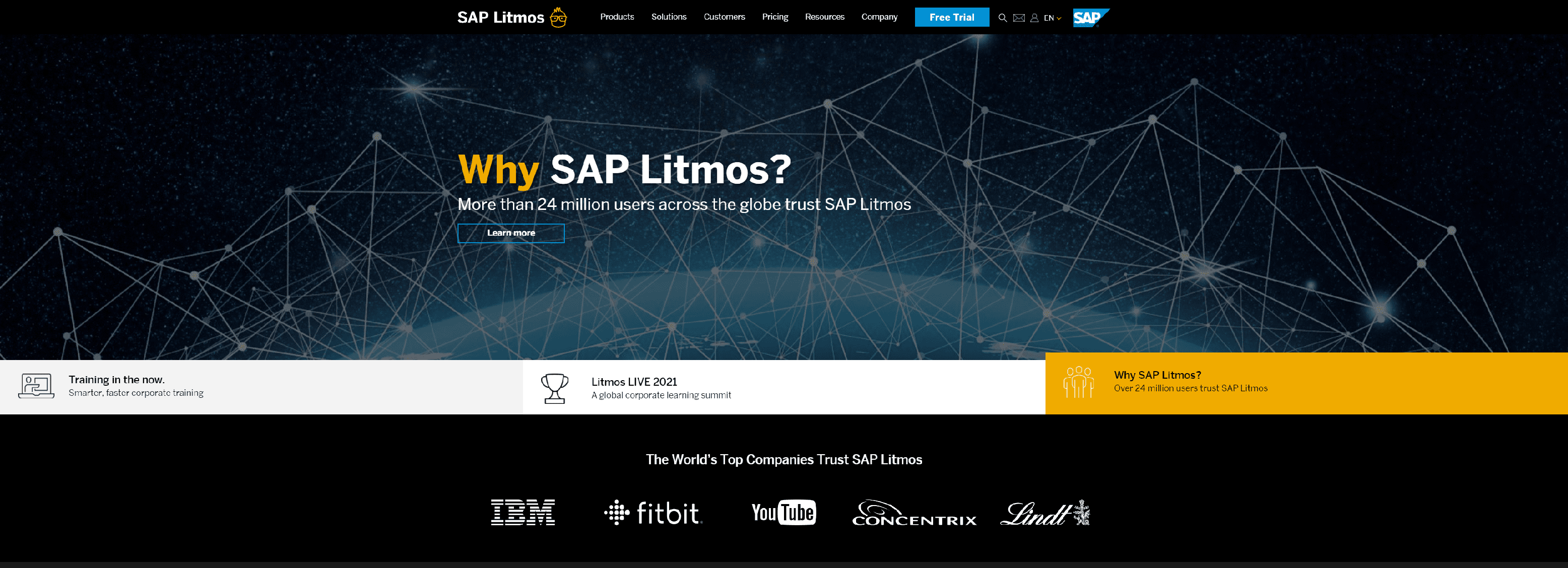
Deliver training anytime, anywhere with our easy to use learning management system, pre-built courses, and e-learning solutions.
LMS:
- Online course builder and content management
- Video assessments
- Tracking and reporting
- Instructor-led training (ILT)
- eCommerce
- Gamification
- Customized learning paths
- Social learning and notifications
- Task automation
- Built-in content authoring
- Custom branding
- Global scalability
Courses:
- An ever-growing library of relevant training courses
- Short, engaging content designed to drive retention
- Updated within SAP Litmos Training (no manual effort)
- All video-based, professionally developed courses
- New courses added regularly, free of extra charge
- Supplemental materials (e.g. workbooks, handouts, etc.) included
Online Learning by Skillshare
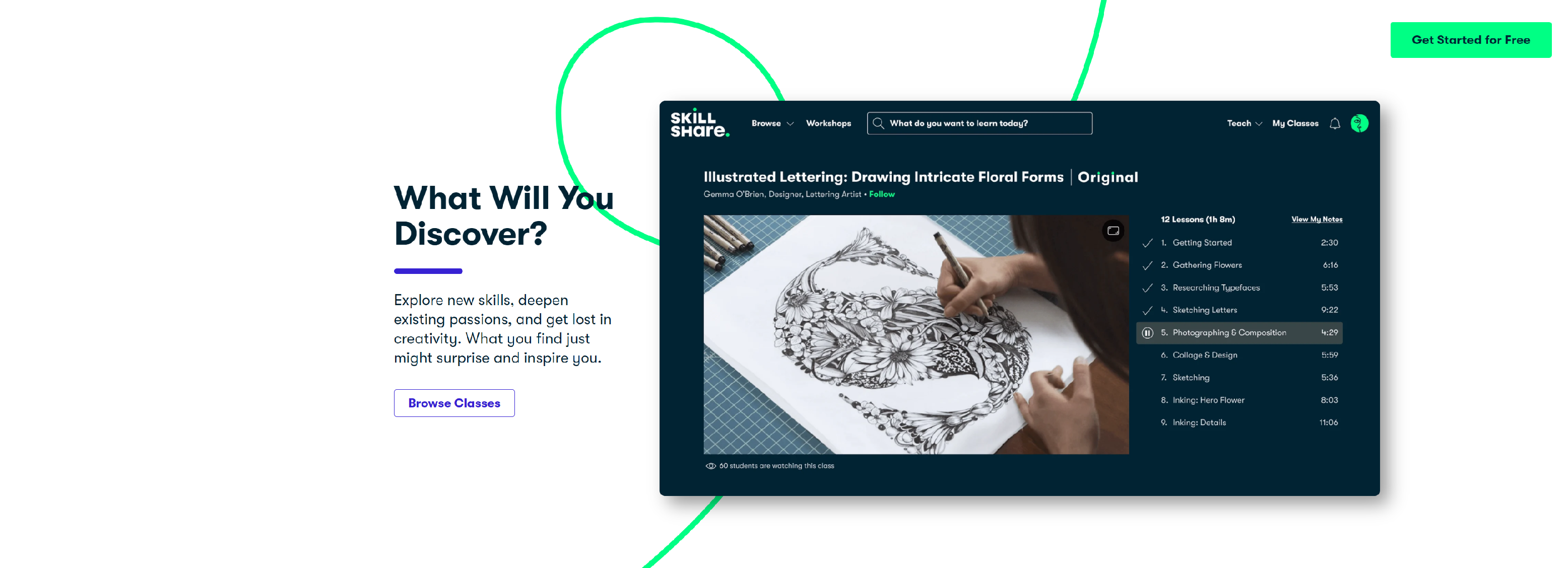
Skillshare is an online learning platform with thousands of creative classes taught by experts and professionals to help you learn new skills.
Creative:
- Animation
- Drawing
- Graphic Design
- Illustration
- Photography
- And More.
Business:
- Entrepreneurship
- Freelance & Entrepreneurship
- Leadership
- Marketing
- Productivity
- And More.
Technology:
- Data Science
- Game Design
- Mobile Development
- Product Management
- Web Development
- And More.
Lifestyle:
- Crafts
- Culinary
- Gaming
- Health & Wellness
- Languages
- And More.
FutureLearn: Online Courses and Degrees from Top Universities
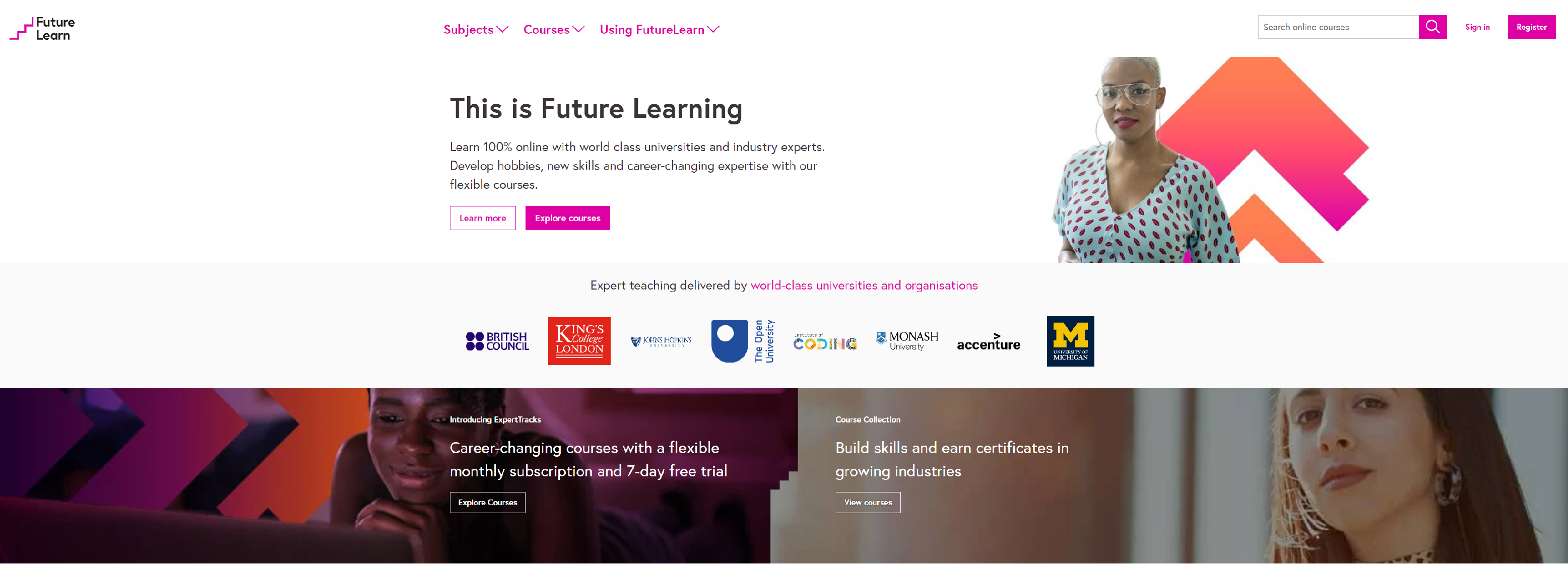
Find online courses and degrees from leading universities or organisations and start learning online today.
- Learn wherever, whenever
- Get a world class education online
- Start courses to advance your career
- Enter a global classroom of millions
WizIQ: Virtual Classroom and LMS Software
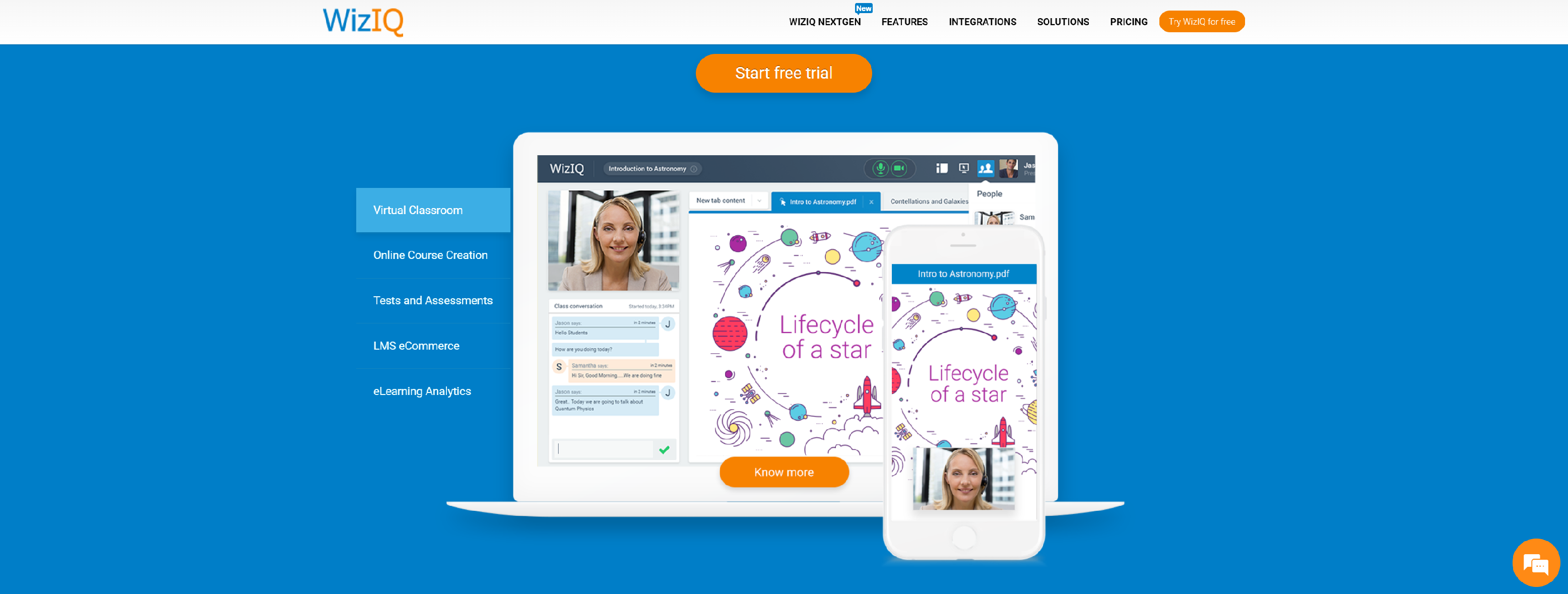
Virtual Classroom and LMS Software to deliver live and self-paced online courses. Everything you need to teach and train online.
- Create and sell online courses
- Take your tutoring online
- Create MOOCs easily
- Deliver learning on the go
- Train your customers
- Train your partners
Ruzuku – Teach Amazing Courses People will Love
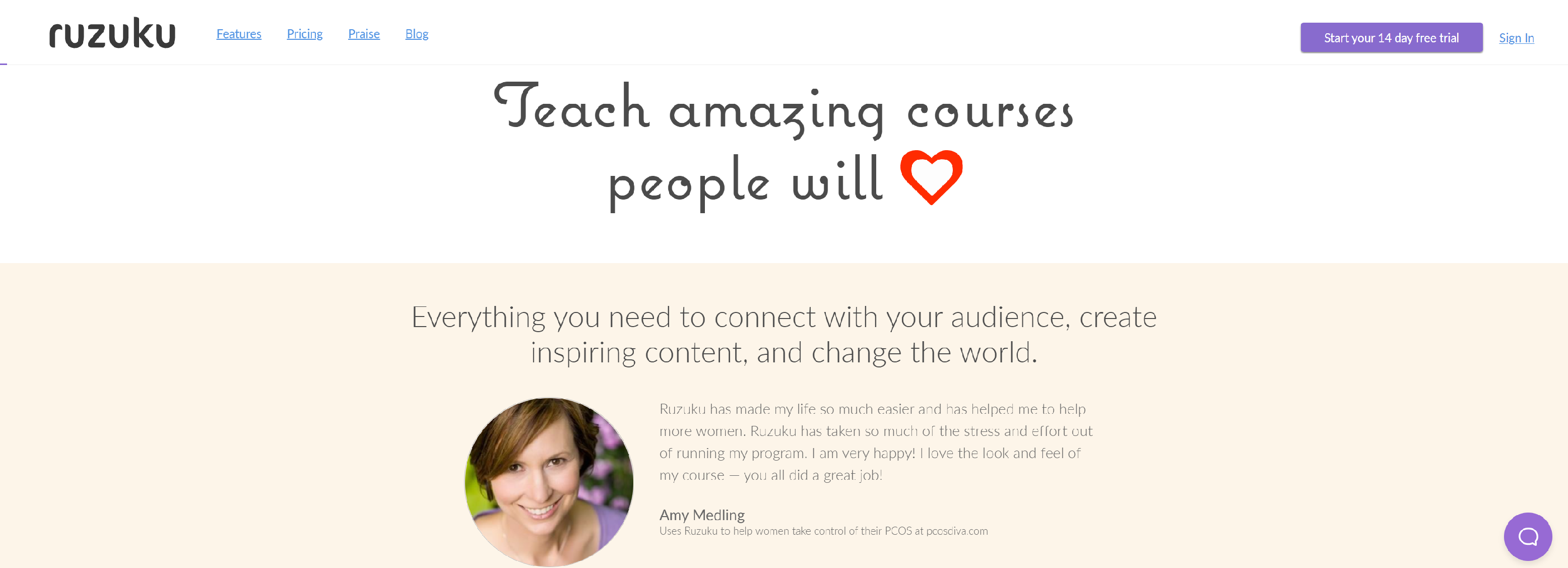
Ruzuku includes everything you need to start creating courses. Not only can you create a course – you can actually start accepting registrations and making money from your course during your trial without paying us a dime.
- Accept payments through Stripe, PayPal or your own payment system
- Create free courses
- Invite or remove participants from courses
- Integrate with Mailchimp
- Live (scheduled calendar-based) courses with automatic email notifications
- On Demand (aka Evergreen) courses with drip content
- Open Access (aka Self-Directed) courses
- Copy a previous course and run it again
- Host and stream audio and video
- Host and display PDFs, Word, PPT, and other files
- Host just about any file for download
- Global Content Delivery Network (CDN)
- Daily backups
- Students have social profiles, bios, and photos in the course community
- Discussion questions/prompts for specific activities/content
- Students can post images, PDFs, and videos in their responses
- General course-wide Q&A and forum
- Receive email notifications when a student posts a question
- Send email announcements to all participants in course
- Students can mark each activity as “complete”, and track their own progress
- Course Health feature shows students’ activity completion and comment rates, with data for the whole course or by lesson
- Host teleconferences with slides, group chat, and automatic recording
- Host video broadcasts with slides, group chat, and automatic recording
- Easy access to support via Phone, Skype, Email, Facebook Group, Knowledge Base, Training Courses, and Tutorials
- Your students ALSO have easy access to support as they register, pay, and access your courses